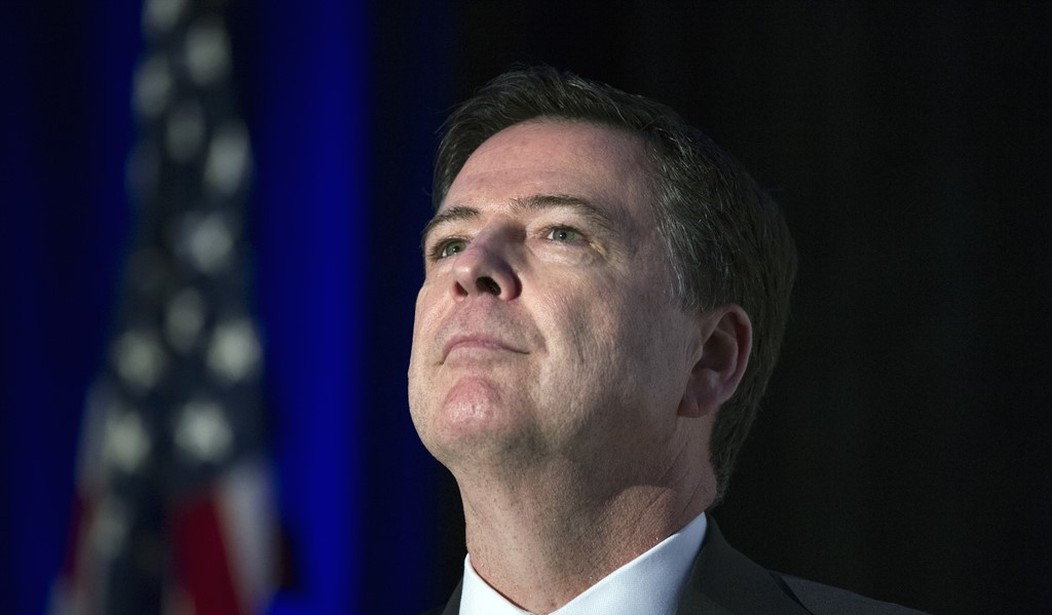When James Comey decided to, in the words of deputy Attorney General Rod Rosentein, “usurp” the authority of the Department of Justice last July by going public with the findings in the Hillary Clinton investigation, a tarmac meeting between AG Loretta Lynch and Bill Clinton may not have been the only reason. The Washington Post reports that the FBI had intelligence from a Russian source that Lynch had discussed the investigation with someone in the Clinton campaign and promised them she would not allow prosecution to move forward. The intelligence apparently played a significant role in Comey’s decision to bypass Lynch, and perhaps to take the case out of the DoJ’s hands altogether.
And if that intelligence had been true, perhaps that decision would have been justified. However, the FBI concluded the next month that it was false:
In the midst of the 2016 presidential primary season, the FBI received a purported Russian intelligence document describing a tacit understanding between the campaign of Hillary Clinton and the Justice Department over the inquiry into whether she intentionally revealed classified information through her use of a private email server.
The Russian document mentioned a supposed email describing how then-Attorney General Loretta E. Lynch had privately assured someone in the Clinton campaign that the email investigation would not push too deeply into the matter — a conversation that if made public would cast doubt on the inquiry’s integrity.
Current and former officials have said that document played a significant role in the July decision by then-FBI Director James B. Comey to announce on his own, without Justice Department involvement, that the investigation was over. That public announcement — in which he criticized Clinton and made extensive comments about the evidence — set in motion a chain of other FBI moves that Democrats now say helped Trump win the presidential election.
But according to the FBI’s own assessment, the document was bad intelligence — and according to people familiar with its contents, possibly even a fake sent to confuse the bureau. The Americans mentioned in the Russian document insist they do not know each other, do not speak to each other and never had any conversations remotely like the ones described in the document. Investigators have long doubted its veracity, and by August the FBI had concluded it was unreliable.
Supposedly, the intelligence related to an e-mail from Debbie Wasserman Schulz, then the DNC chair, to an official in a George Soros organization in which she claimed knowledge of a conversation between Lynch and Team Hillary staffer Amanda Renteria. The FBI got this document in March 2016, about three months before the DNC hack became publicly known — but the Russian intel did not include the actual e-mail. That made it difficult to authenticate, but at least according to the Post, it was taken seriously enough by Comey and others to decide to cut Lynch out of the loop.
Of course, that leaves off the infamous tarmac meeting between Lynch and Bill Clinton in June as a prime motive for Comey’s decision. However, with the knowledge of this intel as part of the context, the tarmac meeting could have easily been seen as some confirmation that shenanigans had taken place. Lynch has admitted to poor judgment in taking that meeting, but even that hardly covers the inappropriateness of the meeting. And by that time, the Russian hack of the DNC was public knowledge, and the FBI must have figured that the Russians got the e-mail from that source.
Unfortunately, it all turned out to be nonsense. Wasserman Schulz and Leonard Bernardo, the Soros organization figure in the intelligence, don’t know each other and have never communicated with each other. Renteria knows one Loretta Lynch, but it’s the one who did legal work for the Clintons, not the one who became Attorney General — with whom she also has never communicated. Why didn’t the FBI ask these questions at the time — or if they did, why did they remain suspicious until August?
One other point: this might put a different light on the FBI’s request to analyze the DNC’s mail servers, right? Had they gotten access to them right away, the FBI might have realized that their intel turned out to be bad.
Of course, it might not have been merely bad. It might have been purposefully false — a nugget of disinformation intended to undermine confidence within the Department of Justice. To add to that thought, Russia had to know that the DNC hack would get blamed on them as soon as Wikileaks went public with the information, and that would strengthen the credibility of the intelligence, at least for a while. Long enough, perhaps, to disrupt and discredit the DoJ in the Hillary probe? If that was the intent, and if what the Post reports today is true, they scored a bullseye — and suckered Comey into a career-ending episode.








Join the conversation as a VIP Member